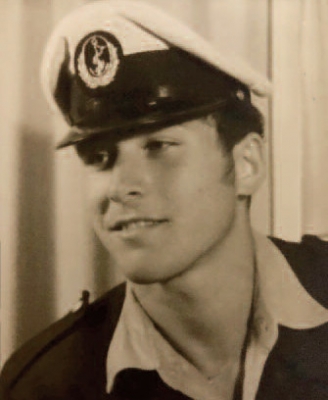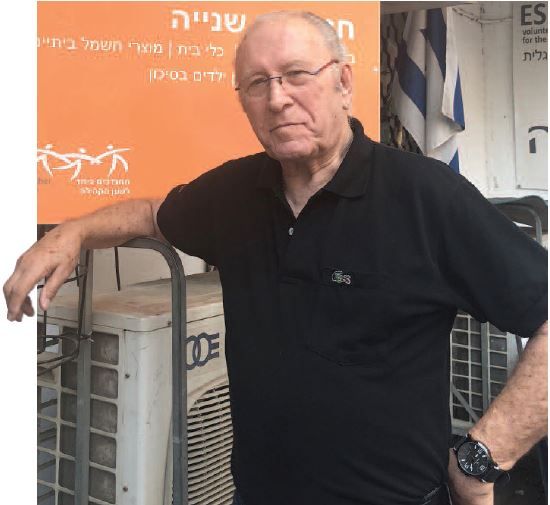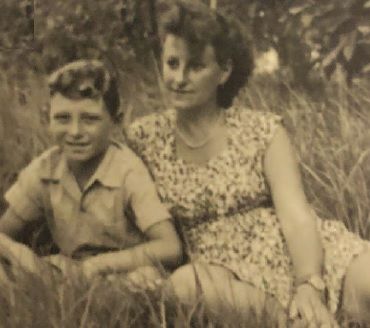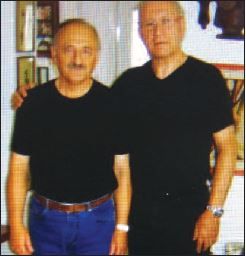Holocaust Friends Reunited
As so many ESRAmagazine readers know, the Raanana ESRA second hand shop sits facing the parking lot at the back of HaNegev Street. Members of the community (mostly ESRA members) generously contribute everything from dishes to furniture, linens, clothing, handbags, shoes, toys, lamps, art, electronics and more.
Shoppers, bargain hunters, eBay re-sellers and the "regulars" (many of whom come every day) all congregate outside the front door as early as 8:30 and wait for Giora to open the door at exactly 9am.
Someone brings him a newspaper, another a croissant but mostly shoppers rush in to find just the item they never knew they could live without! Giora knows what his customers like and want. Dedicated volunteers and employees carefully sort the merchandise and only the nicest things make it to the racks and shelves. Shoppers know each other too and help each other find the perfect item.
When he retired in 2008, after 15 years as the SANO Factory Manager in Hod HaSharon, Giora Fried was recruited (by Richard Stein) to manage the ESRA Thrift shop in Raanana. Giora says that working in the ESRA shop gives him great satisfaction – to the extent that he's there six days a week and rarely takes a vacation.
But the man behind the counter, Giora Fried, is not just the manager; he has a very special story few people know about. Giora survived the Holocaust as a child.
In 2007, Giora got a phone call from a stranger. The man asked him "Were you born in Slovakia?"
"Yes" answered Fried.
"Was your name then Ivan?" Fried again said "yes".
"Someone who lives in Switzerland is looking for you.He says that he has information about your parents."
Giora Fried and Paul Weil were born two months apart in 1943 in Chaskovsa, Slovakia.Their parents grew up together, fled the Nazis together and were murdered together by the Nazis. Their sons were left behind at an orphanage where they were raised as brothers.
When their parents fled from the Germans, Giora found himself in a convent. Paul was also left there by a local farmer. At the end of the war they were transferred, together with many other Jewish children from the area, to an orphanage in the Tatra Mountains. Somehow, over the years, Paul managed to hold on to a group photograph of the children in the orphanage. Giora and Paul appear next to each other in the photo, like brothers.
"When I was four years old, my aunt, who survived Dachau, arrived at the orphanage to take me to my grandmother's home in Slovakia. I lived with her for a year and then my aunt and her husband took me to Israel.A few years later I moved to Kibbutz Lochamei HaGettaot. I went to High School at Michmoret and was then drafted to the Navy where I served as Commander of a patrol boat in the Kinneret"
His friend Paul's uncle survived the war and later took Paul from the orphanage. They lived in Czechoslovakia. At some point Paul's uncle took him to the Jewish Cemetery in Novocha in Slovakia. The two walked until they reached a large headstone engraved with five names.There beside the headstone his uncle told young Paul how his parents, Oscar and Alice Weil, met their deaths when they were shot, together with their dear friends Hugo and Anna Fried and Anna's brother Tibo, in a nearby field.Paul's uncle told him that Hugo and Anna had a son named Ivan who survived. He told him that he and Ivan were together in the orphanage.
In 1967, Paul and a friend traveled to Budapest and Vienna.When their guide wasn't looking the two sneaked away and got to the Israeli Embassy in the city. The next day, they were already on a flight to Israel.In Israel they learned Hebrew and later each got married.Paul didn't make the connection with Giora while in Israel. In 1970, Paul and his family moved to Switzerland where he worked for the Swiss railways for 40 years.
In 2008, after 40 years, the two friends were reunited. Paul posted his orphanage photo on an internet forum of Jews from Czechoslovakia asking if anyone knew Ivan Fried. One day Paul received a reply from someone in Haifa who told him about Giora.
Paul contacted Giora who said: "I didn't know anything about how my parents died and where they were buried. It was the first time I learned who I am and who were my relatives.'
They tried to piece together whatever they could of their parents' lives. Their parents had a farm together and they were the only two Jewish farmers in the area.They were the very best of friends – they lived and died together. They weren't willing to be separated.
After the war, Paul's grandfather, who survived, returned to the village. He found his son but his daughter, Paul's mother, had been killed.With the help of villagers they found and identified the graves of his family members and moved their remains to the Jewish Cemetery and put up a gravestone.
He asks himself why they had to wait so long to be reunited.Today the two stay in touch and Paul even came to Israel for Giora's son's wedding.
Giora reminisces about how he arrived in Israel with nothing and today has three children and seven grandchildren.
When asked what the place of the Holocaust in his life today, Gora said that he doesn't feel traumatized.In his aunt's home the Holocaust was never mentioned. And he never asked.
"I didn't live in the shadow of the tragedy. My aunt's husband used to refer to me as the 'poor orphan' but I never felt that way."
There may even be a pot of gold at the end of this rainbow: Giora's daughter-in-law discovered that there are 75 dunam of land registered in his name in the Czech Republic….now, just imagine trying to claim them!











Comments